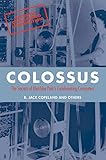The book talks about Tutte and Flowers and how they went about building the world's first true computer. It includes schematics and algorithms and other technical details of the machine. Actually, if you're old enough, you probably remember getting told in your first CompSci classes how computers were made up of I/O, a CPU and memory, which even by the 1980s seemed like a quaint way of viewing things. Reading Colussus for the first time, you really understand why they made the distinction in the textbooks. Just the machines to read and write to paper tape were incredibly complicated, and the speed that you could spool paper tape was a limiting factor in the early days. Indeed the first systems didn't really have a memory system, they had to keep re-reading data from tapes. The need to avoid that was the reason they invented memory in the first place - it sped up computer operations by orders of magnitude!
The book also covers in great detail how they went about intercepting the signals from the German High Command - which itself was a very modern digital modulation scheme that hadn't existed until them. The work of the signals interceptors was very impressive too, and run by the British Post Office, if my memory serves correctly :D
The autobiography of Leo Marks: _Between Silk & Cyanide_[2] was a good (although I suspect quite heavily dramatised & exaggerated) read about the more human elements and flaws of pen & paper crypto used by the allied resistance groups.
[1] http://www.amazon.co.uk/Colossus-secrets-Bletchley-code-brea...
[2] http://www.amazon.com/Between-Silk-Cyanide-Codemakers-1941-1...

1: https://www.amazon.com/dp/0199578141